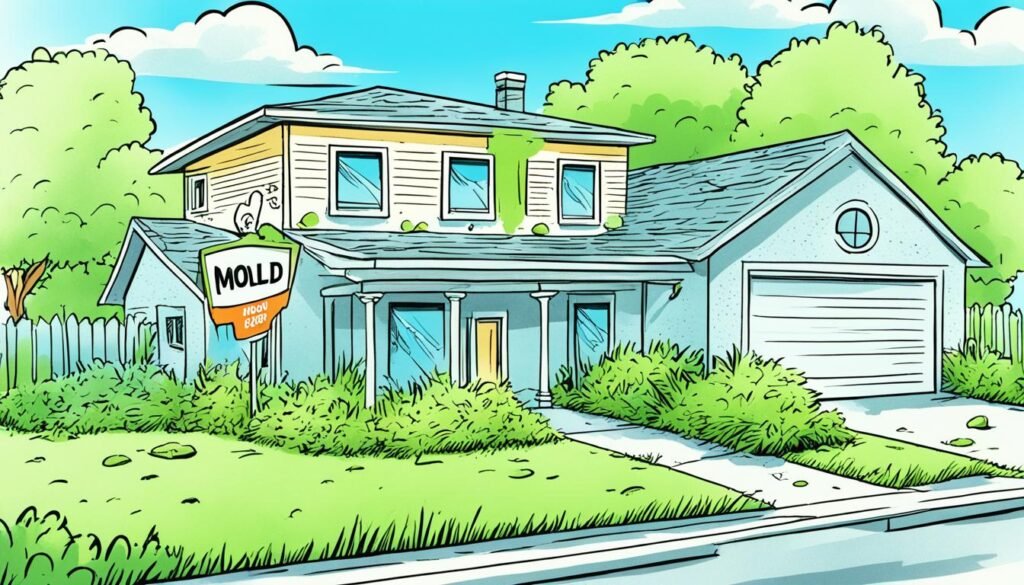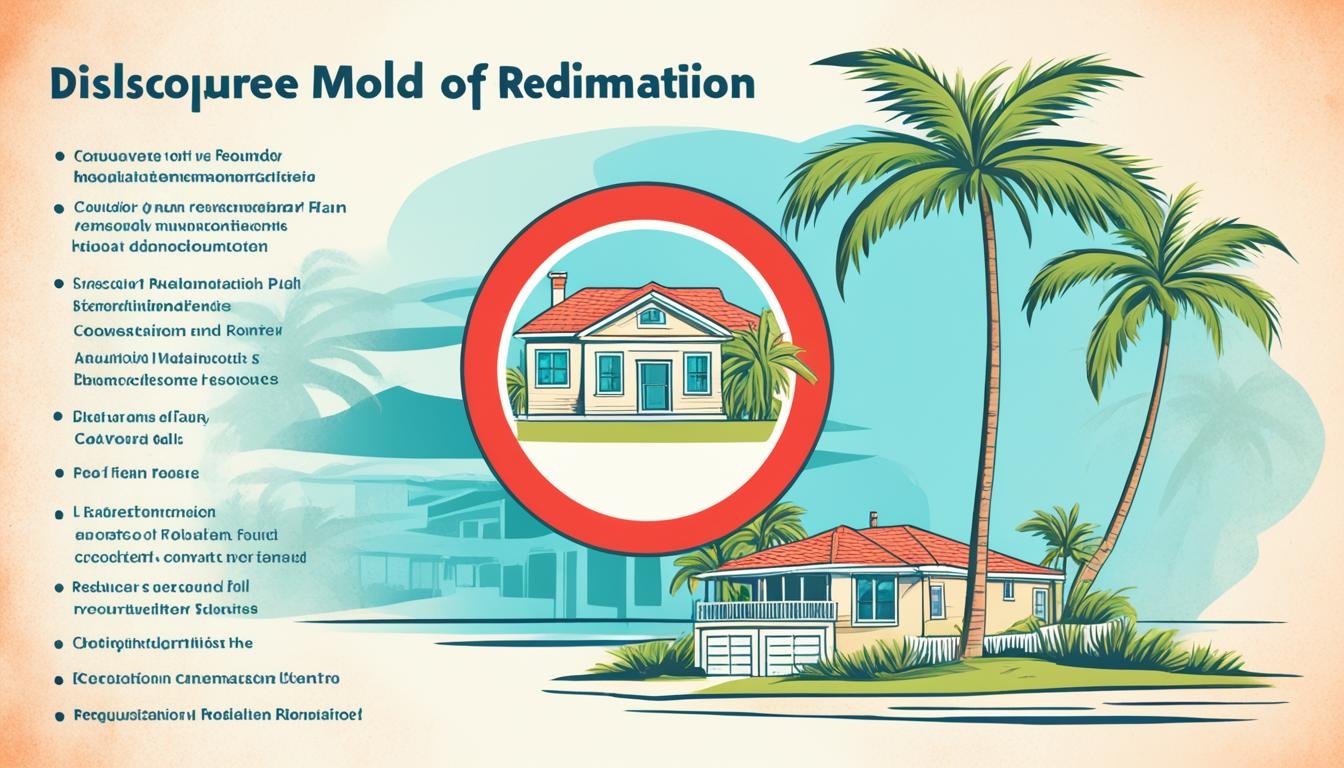In Florida, buyers can back out of a sale if they find big mold issues during the inspection. This could mean paying for cleanup or just around $500 if not specified, as stated in the Mold Inspection Addendum (form CRSP-15)1. Sellers have to tell buyers about any big problems, like mold or leaks, that may lower the property’s value2.
The old saying “buyer beware” no longer applies in Florida. Sellers must now disclose any hidden problems, such as mold from water damage2. This rule even applies to sales marked “As-Is,” meaning sellers can’t avoid telling the truth2.
The Robertson Firm advises buyers to hire expert inspectors. These professionals can find and fix any unseen issues, making sure buyers won’t face surprises later on2. It’s a smart move to protect your investment.
Key Takeaways
- Florida buyers can walk away if they find significant mold during the inspection1.
- Sellers have to reveal any big problems, including mold, even in “As-Is” sales2.
- Hidden issues like wood rot and mold are not rare in Florida homes2.
- The Robertson Firm suggests inspecting homes thoroughly to avoid hidden surprises2.
- Being upfront about any past or current mold problems can help avoid legal headaches.
Understanding Mold Remediation
Mold remediation is crucial for those living in Florida. The state’s humid weather and frequent leaks can cause mold. This process aims to make an area safe by finding, stopping, and removing the mold.
What is Mold Remediation?
Mold remediation is the professional way to deal with mold in buildings. It includes inspecting, stopping the spread, and using filters to clean the air. The specialists remove and clean moldy things to help with air quality. They also try to stop it from coming back by fixing places where moisture gets in.
Common Causes of Mold Growth in Florida Homes
Roof, pipe, and air conditioner leaks, along with high humidity, cause mold in Florida3. Houses with these problems are more likely to have mold. Sellers must tell buyers about any past water, flood, or mold issues3. Not following these rules can cause big problems for buyers and sellers later on.
Health Implications of Mold
Mold can be bad for health. In 2004, the Institute of Medicine found that it worsens asthma and can make others sick1. People with weak immune systems are at a higher risk. Properly dealing with mold in homes is key for keeping buyers safe and healthy.
Mold Remediation Laws for Home Sellers in Florida
When selling a house in Florida, knowing the mold disclosure laws is crucial. Sellers must tell buyers about any issues that seriously impact their home’s value. This includes any history of mold damage2. They also have to mention hidden defects, even if buyers can’t see them right away2.
Legal Requirements for Disclosure
Florida’s mold disclosure laws aim to keep transactions fair for both parties. Sellers must reveal if there has been any mold remediation in the past. Failing to disclose this information can have serious legal consequences4. It’s smart for sellers to keep records of any mold work and make sure the Mold Inspection Addendum accompanies the transaction papers1.
Penalties for Non-Disclosure
Not following Florida’s mold disclosure laws can lead to trouble. Sellers who hide mold issues may have to pay for the cleanup or face legal actions4. If buyers find hidden mold after purchasing the home, they might sue the seller. This could result in more cleanup and possibly paying for any damage caused by the mold2. To lower these potential risks, it’s wise to get advice from a qualified attorney. This could be someone like Gary M. Landau in Coral Springs, Florida, to help you meet the mold disclosure laws1.
Florida Real Estate Disclosure Laws for Mold Remediation
In Florida, if you’ve had mold issues in a house you’re selling, you must be honest. The law says you have to tell buyers about any past problems that could really change the property’s worth2. Things like leaks, mold, and other hazards must be shared2. Sellers should know for sure about these issues before they put the home up for sale2.
Even in sales marked “As-Is,” this rule still applies. Sellers can’t skip telling buyers about hidden issues that might lower the property’s value2. Peter Robertson, who knows a lot about construction law, says getting inspections and advice from experts is key2.
Buyers get a chance to check for mold with the Mold Inspection Addendum. They pay for the test themselves. If they find a lot of mold, they can back out of the purchase1. Fixing big mold problems professionally is important. It helps keep the sale from stalling because of mold issues1. This shows why telling the truth about past mold cleanup makes the transaction smoother1.

For sellers, it’s smart to work with legal pros. This helps you follow all the rules on disclosure, avoiding future legal troubles. Saying if you had mold cleaned up not only follows the law but also builds trust for a good sale1.
Do You Have to Disclose Mold Remediation When Selling a House in Florida
Selling a house in Florida means dealing with mold remediation disclosure. It’s crucial for staying on the legal side of things and keeping the buyer’s trust. Sellers need to be very careful to not reduce the property’s value.
Seller’s Responsibilities
In Florida, sellers have to tell buyers about any known mold. Florida’s law says that this must happen in every home sale, whether it’s a house, condo, or townhome5. The Florida Department of Business and Professional Regulation checks that sellers follow this rule5. Sellers have to write a detailed disclosure statement about the mold, where it is, and how bad it is5. Being honest about mold issues makes the sale process smoother and meets Florida’s mold disclosure rules5.
Impact on Property Value
Talking about mold remediation can really change the property’s value. Not telling buyers can cause big problems later, affecting everyone2. Buyers need to know about mold and not telling them can stop the sale2. It’s vital to tell the whole truth about the mold. It keeps the sale moving and protects the property’s value.
Following your obligations on mold disclosure is more than a legal must. It’s key for keeping the buyer happy and the property’s value up.
Mold Remediation and Home Sales in Florida
Mold removal is key in how home sales go in Florida. It’s crucial that the law on disclosing mold in Florida real estate is followed by both buyers and sellers. The Institute of Medicine notes that mold indoors can cause health issues such as worse asthma and coughing. This shows why tackling mold problems quickly and fully is very important.
Mold can get in a house in many ways, like through AC systems or brought in by people or pets. In Florida, buyers can add a Mold Inspection Addendum (form CRSP-15) to their contract. This lets them test for mold within a certain time. If they find a lot of mold, they can back out of the sale1.
Sellers must also know about mold disclosure laws in Florida. It’s recommended that real estate agents in South Florida use a Mold Inspection Addendum in all deals. This step helps avoid problems with finding mold later and keeps the deal fair for everyone1.
Cleaning up mold correctly is crucial. You can use a bleach mix to clean small mold areas on solid surfaces. But, pros should handle bigger mold spots or those that are hard to reach1. Remember, insurance might not cover mold if it was caused by a flood. Traditional home insurance often doesn’t cover flood-related mold1.
A home’s mold issue might not end the deal in South Florida as long as it’s cleaned up well. But, it could make the sale take longer. So, knowing and dealing with mold and sales in Florida is key for a smooth and legal sale1.
Legal Obligations for Mold Disclosure in Florida Home Sales
Selling a home in Florida with a history of mold cleanup comes with legal responsibilities. State law says sellers must tell buyers about any property issues that significantly drop its value. This includes any past work to remove mold2.
What’s inside the walls must be revealed too, like hidden mold or wood rot. Not sharing these details could mean big trouble. Buyers might take legal action, even after the sale, for not being told about hidden mold or similar problems6.
In Florida, the law is clear: sellers must share what they know about the house’s problems. But they’re not expected to dig up new issues. Even for homes sold “As-Is,” sellers should still list any big problems they are aware of. The fine print of saying “As-Is” doesn’t mean sellers can skip important disclosures26.
If you’re buying a home and worried about what’s not obvious, getting advice from a construction law expert is smart. They can help you understand your rights and avoid surprises2.
Plus, a famous Florida case stresses how crucial it is for sellers to be thorough in their disclosures. They need to reveal any behind-the-scenes issues that might make the property less desirable. Selling a home before 1978? Remember, you must mention if it has lead paint. This makes selling a house even more of a legal maze, so working with a Florida real estate lawyer is a good idea. They make sure you cover all your legal bases6.
Mold Inspection Addendum and Its Importance
The Mold Inspection Addendum is key in Florida real estate deals. It lays out responsibilities for buyers and sellers, especially about mold. This addendum protects your investment and makes sure everyone knows the mold laws in Florida.
How to Use the Mold Inspection Addendum
Buyers can use the Mold Inspection Addendum to check for mold. If they find a lot of mold, they have options. They can back out of the deal, ask for the mold to be removed, or lower the price7. This lets everyone know what they can do if there’s mold in a house in Florida.
Protection for Buyers and Sellers
This addendum is great for both buyers and sellers. It sets clear rules about checking for mold and telling about it. Mold spores can come into a house in many ways, like through the air or on clothes7. Openly dealing with these risks is vital for keeping real estate deals fair under Florida’s mold laws7.
Explore more about the importance of mold inspections during real estate transactions.
The Mold Inspection Addendum is not just a safeguard; it is a commitment to transparency and trust in real estate transactions.
It’s critical for anyone selling a home with past mold issues in Florida to get familiar with this addendum. It shows clear steps to handle mold problems correctly. This is essential to follow the state’s rules about telling buyers if there’s been mold in a house.
Handling Mold Discovery During the Inspection Period
It can be scary to find mold during the inspection period. But, dealing with it right away is key. Both buyers and sellers should follow the Mold Inspection Addendum’s terms for a smooth deal1.
Steps for Buyers
When you spot mold, first figure out how bad it is. For small amounts on solid surfaces, use a bleach mix (1 cup bleach to 1 gallon of water) as the CDC suggests. But, pros should handle big or hidden mold1. If it’s too much, you can back out of the sale and get your deposit back1. Make sure to record what you find and talk to a mold lawyer for legal help.
Steps for Sellers
Sellers, keep good records of any mold fixes. It’s crucial to be open with buyers about any mold issues you’re aware of. Adding a mold inspection addendum in the sales contract makes things clear from the start7. Not sharing known mold issues, even if hidden, could mean paying for the cleanup yourself3. Working with a skilled Florida real estate attorney early on is smart. They can guide you through dealing with these issues effectively.
Negotiating Repairs
Talking about who fixes the mold can be tricky. Buyers can push for mold cleanup or a lower price based on inspection results7. A fair negotiation is key to avoid making the deal more complicated. Sellers should be open to fix the mold together. They can also explore if their home insurance will help pay for it1.
Handling mold finds well during the inspection can prevent problems and ensure everyone is happy with the deal. Using the Mold Inspection Addendum and being open and honest in talks is important. Also, getting advice from a mold lawyer is wise for any post-purchase mold issues you think were hidden. This lays down the necessary legal path to handle these issues smoothly.
What to Do If You Suspect Undisclosed Mold Issues After Purchase
Thinking there might be hidden mold in what you bought is serious. In Florida, sellers are meant to tell buyers about any mold or other big problems in a property they are selling6. The state takes it so seriously because mold can make you sick and cost a lot of money to fix.
Legal Recourse Available
If sellers don’t follow the law and hide mold in a home they sell, buyers have rights. Even if the sale is “as-is,” sellers are still must tell about the home’s real condition, including any mold6. You have a right to take legal action if you were not told about the mold, seeking money for clean-up and other losses.

Hiring a Mold Attorney
Getting advice from a mold lawyer is a smart move if you find mold after buying a house. An experienced attorney in Florida can help you deal with the legal side and try to get you money. They make sure sellers are up front about any mold, to avoid problems later. A real estate pro can also offer helpful advice during this here.
Preventing Mold Issues in Florida Homes
Mold in Florida homes can cause big problems. It often comes in through the air, from windows, and doors. Even people and pets can bring in mold on their clothes or fur1. You can prevent mold by looking for early signs of leaks and moisture. Keeping up with home maintenance and doing regular checks is key to staying mold-free.
Home Maintenance Tips
To keep mold away, you need to maintain your home well. Make sure your roof and plumbing are checked often. This helps find and fix leaks, stopping moisture from building up. Don’t forget about your air conditioner. If it’s not working right, it can create the perfect conditions for mold to grow12.
Importance of Regular Inspections
Regular home checks are crucial. They help you find and deal with mold early on. Looking for damp spots in basements and attics can stop mold growth. When selling, getting a professional inspection is smart. This ensures you follow Florida’s rules about telling buyers if there’s any mold. By staying on top of maintenance, you protect your home and the health of your family.
Source Links
- https://garylandau.com/the-home-youre-buying-or-selling-developed-toxic-mold-now-what/
- https://robertsonfirm.com/what-does-the-seller-of-a-home-have-to-disclose-in-florida/
- https://themold.lawyer/homes/hidden-mold-problems-in-home-purchases-and-sales/
- https://www.homeinc.com/blog/can-i-sell-my-house-in-florida-with-mold/
- https://www.floridiancashbuyers.com/do-you-have-to-disclose-mold-when-selling-a-house-florida
- https://www.nolo.com/legal-encyclopedia/florida-home-sellers-disclosures-required-under-state-law.html
- https://garylandau.com/what-happens-if-mold-is-found-during-home-inspection/

